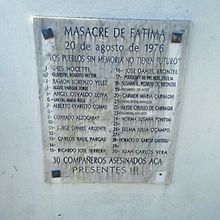
The Fatima massacre refers to an incident in Fátima, Buenos Aires, Argentina, where 30 prisoners in the custody of the federal police were illegally detained, drugged and shot. On August 20, 1976, the bodies of the victims were blown up.
Events
| This section needs additional citations for verification. Please help improve this article by adding citations to reliable sources in this section. Unsourced material may be challenged and removed. Find sources: "Fatima massacre" – news · newspapers · books · scholar · JSTOR (July 2024) (Learn how and when to remove this message) |
Shortly after four o'clock on the morning of August 20, a loud explosion woke inhabitants of Fatima. Workers at a nearby brick foundry arrived on scene and claimed they had found human remains scattered over an area of one hundred yards, presumably a result of the explosion. Almost immediately the area was fenced by soldiers. Photojournalists who had taken photos were kidnapped. The soldiers and civilian staff collected the body parts and loaded them onto a truck of the Municipality of Pilar.
According to the police, the victims were thirty people, ten women and twenty men, including some teenagers. Only five could be identified at the time. The bodies of the unidentified victims were buried in Derqui Pte Cemetery, where they were exhumed years later for identification.
The Argentine Forensic Anthropology Team was able to identify eleven more victims. One of the first was Susana Pedrini of Bronzel, after whom they named a street in the center of Pilar, specifically in the square near the water tank.. Pedrini, who was abducted together with her husband and her mother, was two and a half months pregnant when she was killed. Only half of the victims could be identified by family and friends through the work of the Argentine Forensic Anthropology Team.
On July 11, 2008, two former Argentine police officers were sentenced to life in prison without parole for their role in the killings.
Identified victims
Listed as numbered on the commemorative plaque pictured above:
- Ines Nocetti
- Olivetti, Roberto Hector
- Ramon Lorenzo Yelez
- Aggio, Enrique Jorge
- Angel Osvaldo Leiva
- Lincoln, Maria Rosa
- Alberto Evaristo Comas
- Conrad(o) Alzogaray
- (Jorge) Daniel Argente
- Carlos Raul Pargas
- (Raul) Ricardo Jose Herrera
- Joseph/Jose Daniel Bronzel
- Poddleky de Bronzel, Cecilia
- Susana E. Pedrini de Bronzel
- Pascliarrosa, Jose Jacinto
- Carmen Maria Carnaghi
- Pascliarrosa, Juan Carlos
- Pangoli de Vera, Marta Alida
- Haydee Cirullo de Carnaghi
- Norma Susana Fontini
- Selma Julia Ocampo
- Horacio O. Garcia Gastelu
- Juan Carlos Vera
See also
References
- Anstett, Elisabeth; Dreyfus, Jean-Marc (2017). Destruction and Human Remains. New York: Manchester University Press. p. 148. ISBN 9780719096020.
- ^ Burke, Hilary (July 11, 2008). "Argentine police get life term in 'dirty war' case". Reuters. Retrieved 2009-09-19.
- Ferguson, Sam (July 30, 2008). "The Fatima Massacre". truthout. Archived from the original on October 31, 2010. Retrieved 2009-09-18.
- "BRONZEL - PEDRINI | Nuestros Nietos | Abuelas de Plaza de Mayo". www.abuelas.org.ar. Retrieved 2019-01-14.
- Ginzberg, Victoria. "Susana is back". www.pagina12.com.ar. Retrieved 2019-01-14.
- "Amnesty International Report 2009 - Argentina". United Nations High Commissioner for Refugees. Archived from the original on 2012-10-09.
- Human Rights Watch (2011). World Report 2009: Events of 2008. New York: Seven Stories Press. p. 150. ISBN 9781583228586.
34°26′41.28″S 58°58′52.1″W / 34.4448000°S 58.981139°W / -34.4448000; -58.981139
This article about the history of Argentina is a stub. You can help Misplaced Pages by expanding it. |
- 1976 in Argentina
- August 1976 events in South America
- Deaths by firearm in Argentina
- Dirty War
- 20th-century mass murder in Argentina
- Massacres in 1976
- Massacres in Argentina
- Massacres committed by Argentina
- Pilar Partido
- Police brutality
- Explosions in 1976
- Explosions in Argentina
- Necroviolence
- Police misconduct in Argentina
- Argentine history stubs